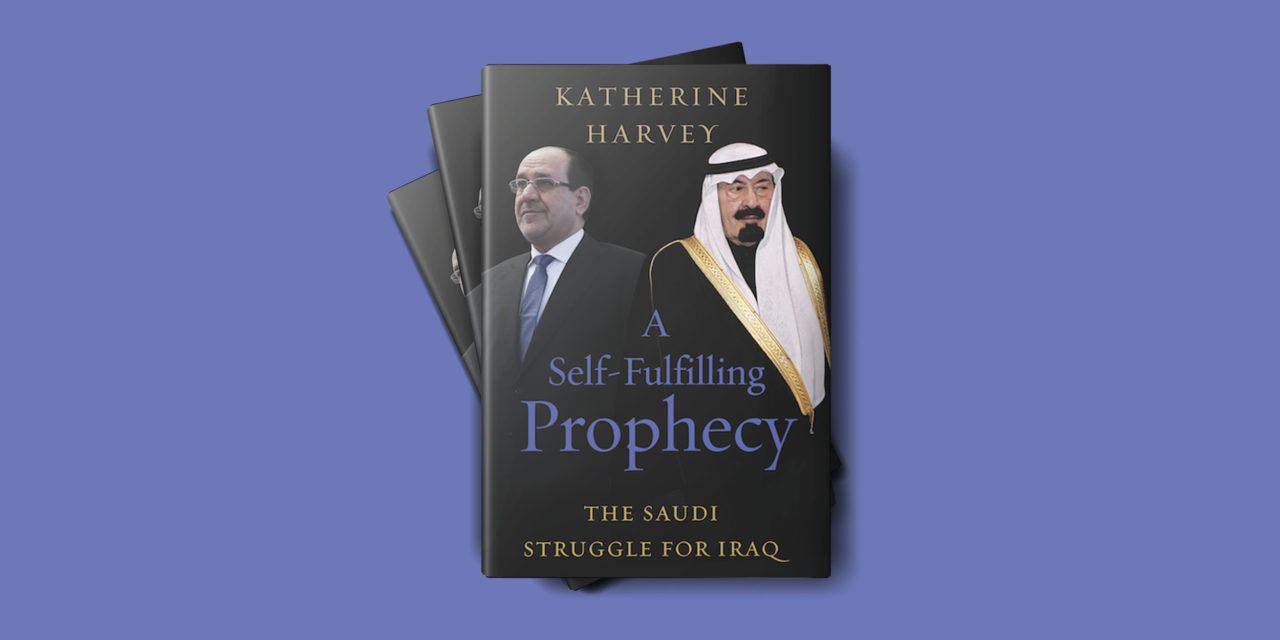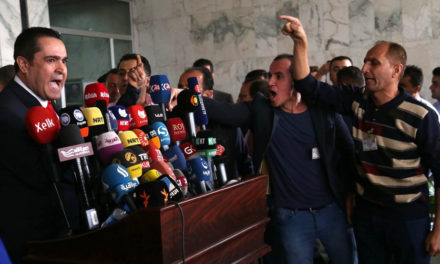(Photo: Hurst Publishers)
A Self-Fulfilling Prophecy: The Saudi Struggle for Iraq by Dr. Katherine Harvey is a timely addition to the scholarship on Iraq. Rapprochement between Iraq and Saudi Arabia emerged in 2015 but there is little written about why it took Saudi Arabia 12 years after the removal of Saddam Hussein to engage with the new Iraq. The release of this book also comes at a time when Saudi Arabia has not only re-established diplomatic ties with its northern neighbour, but it has also relied on Baghdad to host its dialogue with Iran to discuss regional issues including the war in Yemen.
To understand why it took over a decade to reach this point, Dr. Harvey focuses on the two leading Iraqi and Saudi figures: the late King Abdullah bin Abdulaziz Al Saud and former Prime Minister Nouri Al-Maliki. She argues that it was King Abdullah’s unwillingness to engage with Maliki, on the false assumption that the latter was beholden to Iran, that ironically pushed Maliki and Iraq towards Saudi Arabia’s regional nemesis, Iran.
King Abdulllah’s stance stemmed from an implicit bias he held towards Iraqi Shia Arabs, viewing them as being Iranian subjects (much in the same way that Saddam Hussein painted them). His personal bias shaped the policy of the entire Kingdom towards the new Iraqi state and would last until his demise. Dr. Harvey provides convincing evidence that no matter how much of an Iraqi nationalist the sitting prime minister was, as long as they were Shia, King Abdullah was going to be hostile towards the Iraqi premier. This did not bode well for Iraq, given that the Shia are the demographic majority in an informal post-2003 consociationalist system.
It just so happened that Maliki became Prime Minister within a year after Abdullah took reign of the Kingdom, and left office four months before Abdullah’s death. Maliki chose to make Saudi Arabia (rather than Iran, Turkey, or the United States) the site of his first official visit as premier in 2006, in order to cement Iraq’s place in the Arab world. This was the only meeting that occurred between the two leaders because King Abdullah proceeded to ignore Iraq for the remainder of his rule. As a consequence, Iraq found itself with no choice but to get closer to Iran. This singular meeting is frequently referenced in the book as a symbol of Iraq’s early overtures and Saudi Arabia’s dismissal of them.
Much ink has been spilled over Maliki, Iraq’s longest serving post-2003 premier, but very few researchers and analysts have written about him with the nuance that Dr. Harvey has done. This level of nuance can only be achieved if a researcher waits a few years after the leader leaves office. Oftentimes, the accounts on Maliki have been characterized by an assumption that to write about him with nuance is to paint over his shortcomings, which Dr. Harvey mentions as having occurred primarily in his second term. It must be said, however, that this book could not have been written by an Iraqi and received in the same way: as an objective analysis of an important aspect of Iraq’s recent history.
Beyond the figures of Maliki and Abdullah, Dr. Harvey includes important historical facts about the oppression of Iraqi Shias in the 1980s. The Ba’ath Party’s marginalization of many Iraqi communities is well-known, but because of the sentiment shared by many in the region – including King Abdullah – towards Iran, a Shia majority state, the oppression of Iraq’s Shia is consequently forgotten or ignored. This is particularly pronounced in accounts of the Iran-Iraq War, the longest war of the 20th century. According to Dr. Harvey’s research, about one million Iraqis were deported to Iran during the 1980s. This is a devastating figure that would have stolen the headlines of any other war but is rarely mentioned. Or, when it is mentioned, it is done so in the same discriminatory manner that motivated these cruel deportations in the first place. Oftentimes, the concept of sectarianism in the Middle East is dramatized with references to 1400 years ago and an astonishing unwillingness to reference events that occurred only decades ago that have a more direct bearing on the course of politics in the region.
Dr. Harvey’s theoretical contribution to the field of international relations is to highlight how an individual’s biases – in this case, King Abdullah’s sectarianism – can impact international politics in long-lasting and counterproductive ways. The field of international relations, particularly within realist circles, often ignores the role of individual leaders, and the example of both Abdullah and Maliki is a useful corrective to that approach.
Methodologically, Dr. Harvey’s interviews are skewed more towards the Iraqi side than the Saudi side. This is understandable, given that Saudi Arabia is much more closed-off to researchers than Iraq. Despite this, there are a handful of important Saudi interviews including with Prince Turki Al-Faisal, the former Saudi Ambassador to the U.S. and director of General Intelligence. In addition, Dr. Harvey tries to account for the scarcity of interviews on the Saudi side by interviewing several American policymakers and diplomats with experience in both Iraq and Saudi Arabia.
Anyone interested in the story of how post-2003 Iraq managed its relationships in the region, outside of Iran, should read this book. I hope this book inspires other researchers to examine Iraq’s equally complex relationships with its other neighbours.
Many thanks to Dr. Harvey for sending a copy of her book to Baghdad for review.

Hamzeh Hadad
Hamzeh Hadad is a political analyst and former advisor to the president of the Trade Bank of Iraq. He holds an MA from the Norman Paterson School of International Affairs.










